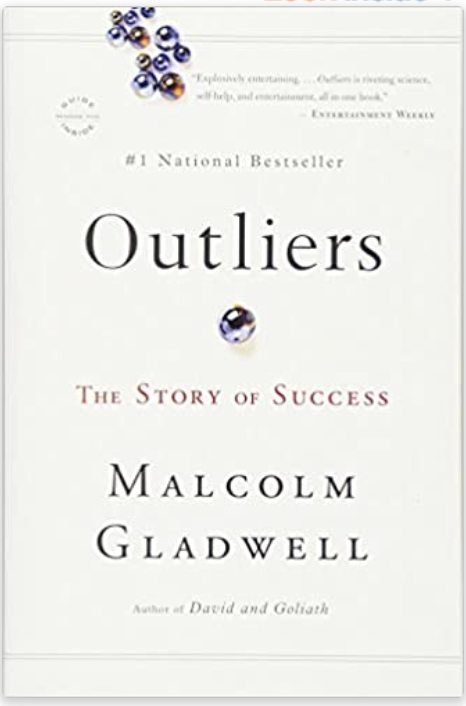
Introduction
In his 2008 bestselling book Outliers, author Malcolm Gladwell asserts that success isn’t the result of intelligence or isolated efforts. Outliers are defined by Gladwell as people who do not fit into our normal understanding of achievement. The book deals with exceptional people, especially those who are smart, rich and successful. It includes those who operate at the extreme outer edge of what is statistically plausible. Outliers are those who fall into an opportunity and have the strength of mind to seize it. Gladwell examines those factors that contribute to these high levels of achievement.
Disclosure: This blog contains affiliate links. If you chose to buy a product through this link, I receive a small commission from the sale, at no extra cost to you.
What Outliers is About
In his introduction, Gladwell lays out the purpose of his book: “it’s not enough to ask what successful people are like. […] It is only by asking where they are from that we can unravel the logic behind who succeeds and who doesn’t.” Throughout Outliers, Gladwell discusses how family, culture and friendship each play a role in an individual’s success. He seems to ask whether successful people deserve all the accolades.
The book has two parts beyond the Intro and Epilogue: Part One: Opportunity contains 5 chapters, and Part Two: Legacy has 4. Throughout the first part of the publication, Gladwell mentions the “10,000-Hour Rule”. He claims that the key to achieving world-class expertise in any skill is, to a large extent, a matter of practicing for a total of 10,000 hours. The author took this from a study by Anders Ericsson. That researcher felt Gladwell overgeneralized, misinterpreted and oversimplified his findings.
Canadian Hockey Players
Gladwell adds to the practice rule the factors leading to the opportunity for the individuals to get that amount of practice. To support his thesis, Gladwell uses an example that most successful Canadian ice hockey players are born in the first few months of the year. He postulates that those more mature kids are often identified as better athletes. This leads to extra coaching and a higher likelihood of being selected for elite hockey leagues.
Microsoft Co-Founder Bill Gates
As further support, Bill Gates met the 10,000-Hour Rule when he was fortunate enough to gain unique access to a high school computer in 1968 at age 13. Gates developed his computer savvy by spending 10,000 hours learning programming on it. Without that access, Gladwell asserts Gates might not have become one of the wealthiest men in the world. He neglects to mention that Gates’ mother was more than an ordinary daughter of wealthy businessmen, having access to the board of directors of IBM!
The Beatles
Another example provided by Gladwell was the astronomical success of The Beatles. He examined their early career. In the band’s long and frequent live performances in Hamburg, Germany they amassed more than 10,000 hours of playing time. He asserts this cemented them as one of the most successful musical acts in human history. Band member Paul McCartney placed some doubt about the validity of Gladwell’s theory. McCartney pointed out that many bands played equivalent amounts of time in Hamburg. Yet these other bands never amounted to success at the level of The Beatles.
Attorney Joseph Flom
Gladwell uses the case of New York attorney Joseph Flom to illustrate how opportunity played a role in the development of his very successful law firm. He cites the year of Flom’s birth as well as his religious and cultural upbringing. Added to that was the good fortune his firm became experts at an up and coming legal specialty. Gladwell felt all the factors fell into place at the right moment. Mr Flom was fortunate to be in the right place at the right time, with the right expertise. Flom’s firm was able to take advantage of the alignment of these factors.
A Tale of Two Geniuses
Gladwell reminds the reader that genius is not the only or even the most important thing when determining a person’s success. He compares the fates of Christopher Langan (IQ 195) and J. Robert Oppenheimer, the father of the atomic bomb. Both had innate natural abilities that should have helped them both succeed in life. Langan did not reach a high level of success because of the dysfunctional environment in which he was raised. Oppenheimer’s privileged upbringing made a pivotal difference in his life. Gladwell felt this gave him the chance to develop the practical intelligence necessary for success.
The Legacy Portion of Outliers
Gladwell then embarks on discussions of cultural legacies and the importance in success. He explored the cultural behaviors of an Appalachian town in Kentucky and the ethnic theory of Korean plane crashes. The author also discusses why cultural legacies make Asians good at math. And he looks at the importance of time students spend in educationally rich environments to account for the success of an inner city school program. He even concludes his book with an account of the unique roots of his Jamaican mother, a descendant of African slaves. Gladwell points out how circumstances with his ancestors worked out to help them live a better life.
Conclusions for Outliers
Gladwell noted that ” the biggest misconception about success is that we do it solely on our smarts, ambition, hustle and hard work.” In Outliers, he showed examples that there are far more variables involved in an individual’s success than society cares to admit. The book expands on the concept that you have to be born at the right moment, at the right place, to the right family (well-off usually helps). Then you have to work really hard.
I enjoyed the anecdotes in the book. I was not always in agreement with the generalized conclusions Gladwell drew from these selected examples. But it was an entertaining book. If you want to buy the book, you can get it through Amazon books HERE.
Do you want to learn a way to become a financial success by learning a simple online business model that anyone can master? If so, check out this link to Entre Institute.
